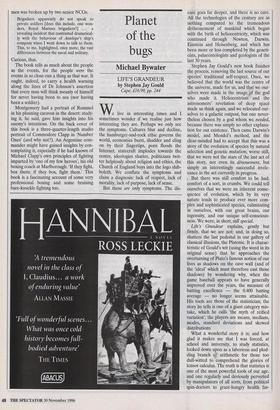Planet of the bugs
Michael Bywater
LIFE'S GRANDEUR by Stephen Jay Gould Cape, £16.99, pp. 244 We live in interesting times and I sometimes wonder if we realise just how interesting they are. Perhaps we only see the symptoms. Cultures blur and decline, the hamburger-and-rock ethic governs the world, economies burst, shudder and cling on by their fingertips, porn floods the Internet, statecraft implodes towards the centre, ideologies shatter, politicians twit- ter helplessly about religion and ethics, the Church of England buys into the logo shib- boleth. We conflate the symptoms and claim a diagnosis: lack of respect, lack of morality, lack of purpose, lack of sense.
But these are only symptoms. The dis- ease goes far deeper, and there is no cure. All the technologies of the century are as nothing compared to the tremendous dethronement of mankind which began with the birth of heliocentricity, which was continued through Newton, Darwin, Einstein and Heisenberg, and which has been more or less completed by the geneti- cists, palaeontologists and geologists of the last 30 years.
Stephen Jay Gould's new book finishes the process, removing the last source of our species' traditional self-respect. Once, we believed that the world was the centre of the universe, made for us, and that we our- selves were made in the image pf the god who made it. Heliocentrism and the astronomers' revelation of deep space made us think again, and we relocated our- selves to a galactic outpost, but one never- theless chosen by a god whom we needed, because there was simply no other explana- tion for our existence. Then came Darwin's model, and Mendel's method, and the clear-minded had to accept that this was a story of the evolution of species by natural selection and genetic mutation; worse still, that we were not the stars of the last act of this story, nor even its denouement, but simply an interestingly successful irrele- vance in the act currently in progress.
, But there was still comfort to be had; comfort of a sort, in crumbs. We could tell ourselves that we were an inherent conse- quence of evolution, which by its very nature tends to produce ever more com- plex and sophisticated species, culminating in ourselves, with our great brains, our ingenuity, and our unique self-conscious- ness. We were, in short, still special.
Life's Grandeur explains, gently but firmly, that we are not; and, in doing so, shatters the last pedestal in our gallery of classical illusions, the Platonic. It is charac- teristic of Gould's wit (using the word in its original sense) that he approaches the overturning of Plato's famous notion of our lives as shadows on the cave wall (and of the 'ideal' which must therefore cast those shadows) by wondering why, when the game baseball appears to have generally improved over the years, the measure of batting excellence — the 0.400 batting average — no longer seems attainable. His tools are those of the statistician; the story he tells is one of a giant category mis- take, which he calls 'the myth of reified variation'; the players are means, medians, modes, standard deviations and skewed distributions.
What a wonderful story it is; and how glad it makes me that I was forced, at school and university, to study statistics, looked down upon as a laborious and plod- ding branch o arithmetic for those too dull-Witted to comprehend the glories of tensor calculus. The truth is that statistics is one of the most powerful tools of our age, and one regularly and deviously perverted by manipulators of all sorts, from political spin-doctors to grant-hungry health fas- cists;. one, too, so regularly swallowed and regurgitated whole by ignorant media folk that, were anyone smart enough to make me editor of something, the first thing I'd do would be to sack one of my pointless, fashionable, metropolitan columnists and hire a statistician. But even if you are practically innumerate, Gould will guide you through his argument, which is this: We believe that evolution has a bias towards increasing complexity, and that therefore a complex, self-conscious species like us is the natural culmination of the evolutionary process. Statistical methods show us otherwise. Evolution starts, because it has to, at a level of minimal complexity. If it at first sight appears to move towards increasing complexity, that's because it has nowhere else to go. We can — and have — become fixated on measuring complexity because that's the Parameter which makes us look good; but we fool ourselves if we believe that evolu- tion is driven in that direction. It's a sort of statistical self-delusion rather like measur- ing 'average' wealth. If Bill Gates moved to a blighted council estate in the depressed north-east, an ambitious local politician might be able to get away with saying that the mean per capita income had suddenly Jumped from, say, £9,500 a year to £300,000 a year; but it would be a very fool- ish resident who tried to get away with Spending it. The truth is that wild extrava- gances on the far right-hand 'tail' of the distribution curve have negligible effect on the 'mode', or most common value, in the Population.
And that is where we live: on the far right-hand edge of the complexity curve. We aren't there because some in-built characteristic of evolution 'wanted' us to be there; if you rewound time to the Cambri- an explosion of life-forms and then hit 'Replay', there would be only the most infinitesimal chance that we, or anything like us, would arise again. True, there would be something at the right-hand tail of the complexity curve, because the curve has to have a right-hand tail; but it wouldn't be US. And the modal life-form would almost certainly be, as it always has been, single- celled organisms. Bacteria, if you like. The most successful complex species on earth are rats, bats and antelopes; but above all, this is the planet of the bugs. Where does this leave poor humanity, struggling for self-respect? That's what I mean when I wonder if we know how inter- esting our times actually are. The thing we can take most comfort in is the understand- ing that Plato was wrong, 180° out of phase. We are not, whatever politicians, quacks, race-supremacists, body-fascists and fashion pundits tell us, all varyingly imperfect imitations of a Platonic ideal. The reality is variation: the thin and the fat, the short and the tall, the black and the White; 'ideals', of whatever sort, are an intellectual abstraction at best, a dangerous delusion at worst.
There are those who would wish other- wise. Hell, I wish otherwise, and I keenly lament the necessity to leave behind the religious faith which was once a source of so much beauty, hope and comfort. But seeing our politicians, on both sides of the Great Centrist Divide, claiming divine affection and attempting to instil god-fear- ing decency in the population, is as sense- less and depressing a spectacle as watching a harassed father trying to persuade his adolescent son to believe once again in a Father Christmas who will bring him no presents if he is naughty.
This isn't a question of 'loss of faith,' of a prolonged Augustinian dark night of the soul which will, God willing, presently lift and allow Christendom to flourish once more. It is, even in the eye-blink duration of our species' existence, a sudden and potentially catastrophic cultural upheaval which must be apprehended even by the most devoutly transcendentalist intellect. It's no good just murmuring tempora mutantur and forgetting the rest: nos et mutamur in§ illis. Here we are, the prod- ucts of chance, our existence not even inherent in the aleatoric system which brought us into being. Designing a world- view and a public and private morality to cope with our understanding of our circum- stances is perhaps the most difficult, and thrilling, challenge so far to face our species.
To order a copy of this book at the special discount price of £12.99, call The Spectator Bookshop on 0181 324 5500.




















































































 Previous page
Previous page